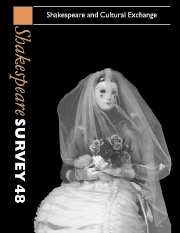Book contents
- Frontmatter
- Shakespeare Translation as Cultural Exchange
- Shakespeare, Theatre Production, and Cultural Politics
- ‘Amphitheaters in the Body’: Playing with Hands on the Shakespearian Stage
- ‘Shakespur and the Jewbill’
- Wilhelm S and Shylock
- Pilgrims of Grace: Henry IV Historicized
- Holy war in Henry V
- Hamlet and the Anxiety of Modern Japan
- Hamlet’s Last Words
- Venetian Culture and the Politics of Othello
- ‘My Music for Nothing’: Musical Negotiations in The Tempest
- The Tempest and Cultural Exchange
- Caliban and Ariel Write Back
- Shakespearian Rates of Exchange in Czechoslovakia 1945–1989
- ‘Are you a Party in this Business?’ Consolidation and Subversion in East German Shakespeare Productions
- The Martyred Knights of Georgian Shakespeariana
- Shakespeare Performances in England, 1993–1994
- Professional Shakespeare Productions in the British Isles, January – December 1993
- 1 Critical Studies
- 2 Shakespeare’s Life, Times, and Stage
- 3 Editions and Textual Studies
- Books Received
- Index
Shakespeare Translation as Cultural Exchange
Published online by Cambridge University Press: 28 March 2007
- Frontmatter
- Shakespeare Translation as Cultural Exchange
- Shakespeare, Theatre Production, and Cultural Politics
- ‘Amphitheaters in the Body’: Playing with Hands on the Shakespearian Stage
- ‘Shakespur and the Jewbill’
- Wilhelm S and Shylock
- Pilgrims of Grace: Henry IV Historicized
- Holy war in Henry V
- Hamlet and the Anxiety of Modern Japan
- Hamlet’s Last Words
- Venetian Culture and the Politics of Othello
- ‘My Music for Nothing’: Musical Negotiations in The Tempest
- The Tempest and Cultural Exchange
- Caliban and Ariel Write Back
- Shakespearian Rates of Exchange in Czechoslovakia 1945–1989
- ‘Are you a Party in this Business?’ Consolidation and Subversion in East German Shakespeare Productions
- The Martyred Knights of Georgian Shakespeariana
- Shakespeare Performances in England, 1993–1994
- Professional Shakespeare Productions in the British Isles, January – December 1993
- 1 Critical Studies
- 2 Shakespeare’s Life, Times, and Stage
- 3 Editions and Textual Studies
- Books Received
- Index
Summary
In August 1994 the Guardian’s drama critic concluded his review of Peter Zadek’s production of Antony and Cleopatra at the Edinburgh Festival by claiming that its value to him lay in its not being in English: ‘Shakespeare in a foreign tongue’, he wrote, ‘becomes an analogue to the original that gives the director new freedom’, and ‘it will be hard’, after this, ‘to go back to traditional productions’. While it could be argued that Michael Billington, in journalistic haste, is confusing the strength of a ‘startling, radical, Brechtian’ production with the alienation effect of a foreign language, this was not so with Clement Scott, the formidable Daily Telegraph reviewer, when nearly a hundred years ago he praised Sarah Bernhardt in his book on Some Notable Hamlets of the Present Time (1900). Amazingly he manages to go into raptures over Madame Bernhardt's performance without once commenting on her gender; but he is explicit about the language of this Hamlet: 'With the French version of the immortal text I was charmed. It conveyed Shakespeare's idea in a nutshell' (p. 51). Both then and now, it seems, drama reviewers can be Sentimental Travellers: 'They order this matter better in France' . . . or in Germany . . . or Japan.
But I wonder, when it comes to thinking about the implications of Billington's and Scott's proclaimed positions, if academic critics are such travellers? And, how seriously do we think about those implications? I wonder, that is, whether to the immensely fertile body of current Shakespeare studies, the study of translations might not be a stepchild — 'an interesting and harmless occupation for researchers abroad', as the editors of the recently published and excellently thought-provoking collection of essays on European Shakespeares put it, lamenting the lack of reciprocity between their discipline and English and American Shakespeare studies.
- Type
- Chapter
- Information
- Shakespeare Survey , pp. 1 - 12Publisher: Cambridge University PressPrint publication year: 1996
- 1
- Cited by

